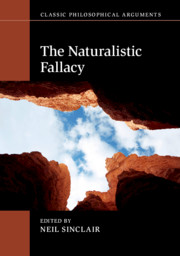Book contents
- The Naturalistic Fallacy
- Classic Philosophical Arguments
- The Naturalistic Fallacy
- Copyright page
- Contents
- Contributors
- Preface
- Introduction
- 1 The Naturalistic Fallacy and the History of Metaethics
- 2 The Naturalistic Fallacy: What It Is, and What It Isn’t
- 3 The Context and Origin of Moore’s Formulation of the Naturalistic Fallacy in Principia Ethica
- 4 No-Ought-From-Is, the Naturalistic Fallacy, and the Fact/Value Distinction: The History of a Mistake
- 5 Evolution and the Naturalistic Fallacy
- 6 Motivation, Recommendation, Non-Cognitivism, and the Naturalistic Fallacy
- 7 Open Question Arguments and the Irreducibility of Ethical Normativity
- 8 Should Analytical Descriptivists Worry about the Naturalistic Fallacy?
- 9 Normativity and the Naturalistic Fallacy*
- 10 The Naturalistic Fallacy and Theological Ethics
- 11 The Phenomenology of Moral Deliberation and the Non-Naturalistic Fallacy
- 12 Epistemic Relativism and the Naturalistic Fallacy
- Bibliography
- Index
- References
Bibliography
Published online by Cambridge University Press: 16 November 2018
- The Naturalistic Fallacy
- Classic Philosophical Arguments
- The Naturalistic Fallacy
- Copyright page
- Contents
- Contributors
- Preface
- Introduction
- 1 The Naturalistic Fallacy and the History of Metaethics
- 2 The Naturalistic Fallacy: What It Is, and What It Isn’t
- 3 The Context and Origin of Moore’s Formulation of the Naturalistic Fallacy in Principia Ethica
- 4 No-Ought-From-Is, the Naturalistic Fallacy, and the Fact/Value Distinction: The History of a Mistake
- 5 Evolution and the Naturalistic Fallacy
- 6 Motivation, Recommendation, Non-Cognitivism, and the Naturalistic Fallacy
- 7 Open Question Arguments and the Irreducibility of Ethical Normativity
- 8 Should Analytical Descriptivists Worry about the Naturalistic Fallacy?
- 9 Normativity and the Naturalistic Fallacy*
- 10 The Naturalistic Fallacy and Theological Ethics
- 11 The Phenomenology of Moral Deliberation and the Non-Naturalistic Fallacy
- 12 Epistemic Relativism and the Naturalistic Fallacy
- Bibliography
- Index
- References
- Type
- Chapter
- Information
- The Naturalistic Fallacy , pp. 265 - 281Publisher: Cambridge University PressPrint publication year: 2018

